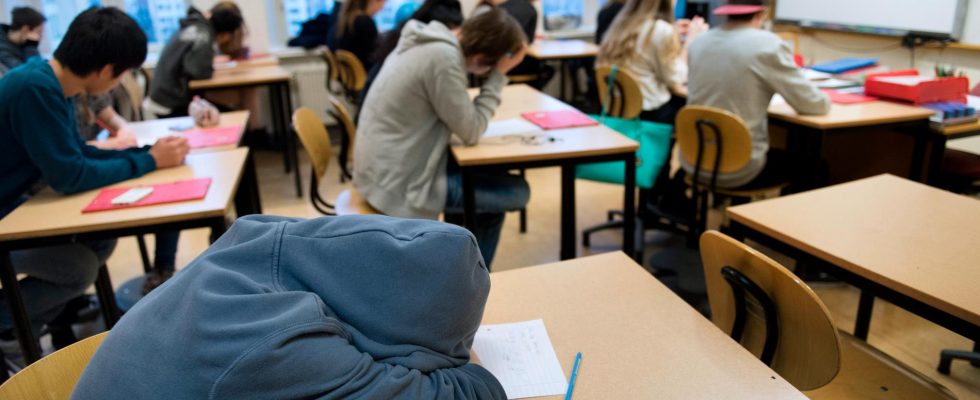1 / 3Photo: Jessica Gow/ TT
Anxiety and depression among young people can be prevented through education, research shows. But despite the fact that mental health is included in the curriculum, it is often missing in teaching.
– A reform shift is required for Swedish school policy, says Johanna Jaara Åstrand, chairman of Sweden’s Teachers.
Every second 15-year-old suffers from recurring mental problems and the most common cause of death among young people is suicide. Mental health has been part of the Swedish curriculum since the 1980s – but according to the School Inspectorate, the skills are rarely taught.
– Based on our data, we have seen that if you teach children about mental health at school, they feel better. Young people want to talk about mental health and want more knowledge about this, says Anja Romqvist, investigator at the Public Health Agency.
Severe deterioration
The Public Health Authority stated in 2018 that the mental health of children and young people has deteriorated significantly since the mid-1980s. Since then, the situation has worsened further.
According to the World Health Organization (WHO), education and knowledge are crucial to countering mental illness in young people. In the neighboring Nordic countries, investments in school education have begun, but in Sweden the overall approach is lacking. Here, only a few schools teach the subject.
– We see clear differences between schools in how well they work with prevention and promotion factors, says Torun Rudin, chief of staff at the School Inspectorate.
– To a large extent, you teach about what the students can do themselves. It can become problematic if questions about dealing with a stressful school situation are placed mainly on the students, rather than systematically working with planning and prevention at the school.
“Great grief”
The psychologist Siri Helle, together with a number of non-profit associations, has started the campaign “Mental health on the schedule” with the aim of teaching about mental illness in school. Organizations such as Bris, Mind, Unicef and Suicide Zero are behind the campaign.
– It is a great sadness in the teaching profession that we have so many students, especially girls, who feel so bad, says Johanna Jaara Åstrand, president of Sweden’s teachers.
The School Inspectorate’s review shows that there are few Swedish schools that actually schedule and give students knowledge about how mental illness can be prevented and managed.
– A reform shift is required for Swedish school policy, where both teachers and students are given the opportunity to be and do their best. It is necessary for us to have a sustainable school situation, which is not the case today, says Johanna Jaara Åstrand.
National strategy
The government writes in the Tidö agreement that it wants to prioritize mental health and work with suicide prevention among young people, as part of public health work.
A national strategy for mental health and suicide prevention must be reported on September 1 this year and submitted by the School Inspectorate and 25 other Swedish authorities that have worked together with the proposal.
“The cooperation between the school, health care and social services needs to improve. But above all, accessibility needs to increase. Having to wait for help for too long can cause small problems to grow into major psychological problems,” writes Education Minister Lotta Edholm (L) in a comment to TT.
FACTS There is help to be had here
If you have suicidal thoughts, you can read more at 1177.se.
If you need someone to talk to, there are these helplines to contact:
BRIS for children – telephone 116 111
Friends – phone 08-545 519 90
The suicide line – telephone 90101
Mind’s Lifeline – chat on mind.se
BRIS for adults – telephone 0771-50 50 50
If you feel so bad that the situation feels unbearable or if you have plans to take your own life, you should seek treatment immediately at a psychiatric emergency department or call 112.
Source: Public Health Agency
Read moreFACTS School children’s health habits 2021/2022
The national survey “School children’s health habits 2021/2022” investigates how the living conditions, lifestyle and health of children and young people aged 11, 13 and 15 develop over time.
The report shows that:
Several school factors go in the wrong direction: how students enjoy school, the stress they experience, the relationship with teachers and classmates is worse.
Bullying is increasing at school.
There is a reciprocal relationship between feeling good and performing in school.
Self-reported health problems are increasing. These include psychosomatic symptoms such as anxiety, irritation, headache, back pain, dizziness and difficulty sleeping.
Source: Public Health Agency
Read more FACTS The curriculum and campaign proposals
The curriculum states that part of the teaching in biology from year 4 must deal with how mental and physical health is affected by “living conditions, diet, sleep, hygiene, exercise and addictive substances”. From year 7, students must learn about how “health problems can be limited at the individual and societal level”.
The campaign “Mental health on schedule” offers suggestions that students should acquire basic skills in conflict management and ways to deal with emotions such as stress and anxiety. Also when and how to seek help and how factors such as exercise and sleep can affect mental health.
Source: Swedish National Agency for Education
Read more
